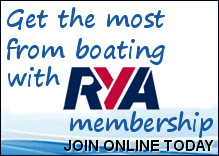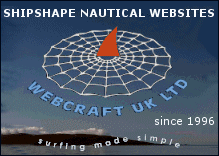RYA Sail Cruising Courses
The RYA Sail Cruising scheme
The only organisation in the UK offering a widely recognised comprehensive training scheme for the cruising yachtsman is the Royal Yachting Association, more usually referred to as the RYA. If you need a qualification that is universally recognised, which will (for example) open the door to bareboat chartering in most parts of the world, then you should be aiming for an RYA qualification.
There are a series of theory courses available either via night classes offered at many local colleges and other establishments, by distance learning or through self-study with the help of widely available commercially produced materials. There is an examination at the end of the course, and a certificate is awarded. For more detailed course content see the RYA website. Local evening class courses, if available, usually offer the best value, while many sea schools also offer concentrated theory courses over a week or three weekends.
One point to notice is that while theory courses are universal practical courses come in two varieties - Tidal or Non-Tidal. The Non-Tidal courses apply primarily to those who intend to spend their cruising life in the Mediterranean or on some other non-tidal stretch of water. They cover every aspect of practical seamanship with the exception of matters relating to tides. Many schools abroad, particularly in the Mediterranean, offer RYA practical courses, but these are non-tidal and resulting qualifications may not be favourably looked on if you wish to charter in tidal waters (eg the UK). If you like the idea of training abroad but want a tidal qualification, then it is worth knowing that schools operating in the Straits of Gibraltar usually offer tidal certificates, as do schools in the Canaries
Start Yachting
A short introduction to sailing for complete beginners. By the end of the course you will have experienced steering a yacht, sail handling, ropework and be aware of safety on board. Holders of the Start Yachting certificate can go on to complete the Competence Crew course in a reduced time of three days or two weekends.Competent Crew
This course is for beginners and those who would like to become active crew members rather than just passengers. By the end of the course you should be able to steer, handle sails, keep a lookout, row a dinghy and assist in all the day to day duties on board.Day Skipper
The minimum pre-course experience required is 5 days living on board, 100 miles logged (in tidal waters for tidal courses) and 4 hours night sailing. Possession of the RYA Day Skipper Shorebased certificate is desirable but is not essential if you have a sound understanding of the principles of navigation and tides. At the end of the course you should have the confidence to skipper a small yacht in familiar waters by day. A course completion certificate is issued, but there is no examination as such. If you have completed this course and have the shorebased certificate, then this may be accepted as proof of competence for bareboat charter - provided your personal sailing experience is considered adequate for the vessel and waters in question. This certificate is also acceptable in an application for an International Certificate of Competence (see below).
Coastal Skipper
There are two types of coastal certificate:
The Coastal Skipper course completion certificate, that is awarded by a training centre on successful completion of a five-day training course. This is very much hands-on with little time to teach navigation or other theoretical subjects. It is therefore recommended that you take the RYA Coastal Skipper shorebased course prior to your practical course so you can put those skills into practice on the water.
The Yachtmaster Coastal Certificate of Competence, that is awarded by the RYA/MCA on successful completion of an exam. You are not required to take the five-day Coastal Skipper course above prior to your exam. However, if you have not previously taken RYA training you may find it useful to complete the course or organise some informal tailor-made tuition.
(The examination is carried out by an external RYA examiner (i.e. not by the school running the course, although you can usually use their yacht). You have to provide a seaworthy yacht over 25ft LOA plus a crew. The minimum pre-exam requirements are 30 days on board (2 Days as Skipper), 800 sea miles and a minimum of 12 night hours. (The requirement for holders of the Coastal Skipper Course Completion Certificate is reduced to 20 days on board [2 as Skipper], 400 miles on board and a minimum of 12 night hours). You must also hold the Restricted (VHF only) Radio Operators Certificate or its new replacement, the SRC (Short Range Certificate) and a valid first aid certificate.
Having gained your Coastal Skipper certificate you can have it commercially endorsed provided you hold a valid certificate of medical fitness and have attended a sea survival course. The commercial endorsement enables you to skipper vessels up to 24m in length for sport or recreation on a commercial basis up to 20 miles from a safe haven.)
Yachtmaster
An RYA Yachtmaster™ Certificate of Competence is often the ultimate aim of aspiring skippers. It is a well known, highly respected qualification worldwide, proving your experience and competence as a skipper. Unlike other courses in the cruising programme, there is no formal training to complete in order to become a Yachtmaster™. Instead, provided that you have sufficient experience and seatime, you can put yourself forward for an exam to test your skills and knowledge.
There is no such thing as an RYA Yachtmaster Offshore practical course, but many establishments offer what they call Yachtmaster Preparation courses. These are usually five day courses designed to prepare you to pass the yachtmaster assessment at the end of the course. The school in question will usually let you use their yacht for the exam, which will be carried out by an external examiner.
You can have this certificate commercially endorsed provided you hold a valid certificate of medical fitness and have attended a sea survival course. The commercial endorsement enables you to skipper vessels up to 24m in length for sport or recreation on a commercial basis up to 60 miles from a safe haven.
International Certificate of Competence (ICC)
To sail a yacht in many European coastal waters including Poland and the Baltic states, Portugal, Italy, Greece, Croatia and Turkey now requires an ICC (International Certificate of Competence), which represents a minimum level of competence in helmsmanship, navigation and collision avoidance. A course completion certificate for Day Skipper practical or above is sufficient evidence for operating a sailing vessel with an auxiliary engine, and obtaining an ICC generally only requires attaching a photocopy of the certificate. If you want to navigate inland waterways (eg if you are planning going through the French canals to the Med) you will also need a CEVNI certificate (which involves sitting an exam demonstrating a knowledge of European inland waterway regulations) as well. Many RYA centres now offer this. For further details see the RYA website. (Search ' whole site' for ICC).



